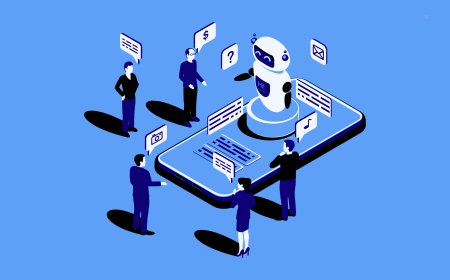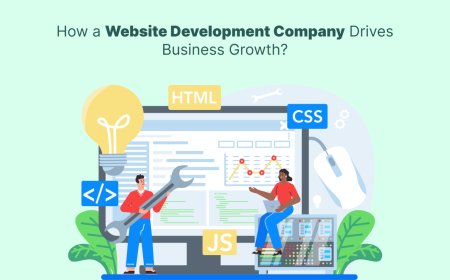AI Integration Services and Their Impact on Efficiency
Discover how AI integration services are transforming operations, driving greater efficiency, reducing manual workloads and changing industries through intelligent automation and intelligent workflows.

Introduction
The speed at which companies are changing today is unprecedentedthanks primarily to the desire to optimize operations and cut costs and also to increase productivity. The acceleration of such transformation is largely fueled by the increasing prevalence of AI integration services. These services enable organizations to infuse AI into their daily operations, systems, and applications, to unleash new insights and efficiencies.
AI implementation services are not the future but mandatory in todays business world. From automated customer services, predictive analytics, smart inventory management and more, companies in different sectors are applying AI integration services to boost efficiency. AI technologies, by automating repetitive tasks and informing data-driven decisions, are transforming businesses not just from the outside in.
In this article, we delve into how the influence of AI integration services is affecting organizational productivity, the sectors are reaping the most benefits from these and how businesses can implement them without fail.
What Are AI Integration Services?
Bringing Intelligence Into Everyday Operations
AI integration services: AI integration is the process of incorporating AI technology into your business systems and operations. This could mean the injection of machine learning models, NLP, RPA, computer vision and other AI tools directly into platforms such as CRMs, ERPs, websites, mobile applications and data pipelines.
Integrated AI systems are designed to seamlessly and immediately plug into a businesss digital environment where they can automate certain tasks and provide insightful recommendations, analyse information and interact with customers better than ever.
-
Some examples of common areas that uses AI include:
-
Customer support (chatbots, sentiment analysis)
-
Sales and marketing (predictive analytics, lead scoring)
-
Supply chain (demand forecast, logistics optimization)
-
HR (automated recruitment; analysis of employee commitment)
-
Finance (fraud detection, automated invoicing)
The idea is to make all of AI not just a tool, but an intelligent layer that pervades the entire organization.
Major Advantages Of Using AI in Integration For Efficiency
Save Time, Reduce Errors and Make Smarter Decisions
When done right, AI isnt just automated its completely revolutionized all decision making. Below are some of the main efficiency-related advantages to businesses with integration of AI:
Automated Repetitive Tasks
Manual entering of data, reporting, and administrative work just eats up so much time. AI-driven bots can help automate these tasks, allowing employees to concentrate on higher-value work.
Faster Data Processing
Artificial intelligence algorithms are able to handle an incredible amount of data in a matter of seconds, well beyond human capacity. This frictionless speed means you have access to real-time insights and quicker decision-making as well as leaner operations.
Improved Accuracy
Calculations, data input, customer response might fall us one day, AI even solves these small problems saving, human induced mistakes. This generates reliability and standardization in the various areas over time.
Personalized Customer Experiences
Intelligent systems which can adapt user experiences to behavior and preferences. This leads to increased engagement, greater customer satisfaction, and more conversions.
Predictive Capabilities
From demand prediction to anomaly detection, AI allows businesses to make more confident plans about the future that reduce waste and maximize efficiency.
Industries that can avail the Best from AI Integration Services
AI Isnt Just for Tech Companies
Early adopters among tech giants, AI adoption has now become mainstream across industries:
Healthcare
AI is applied in hospitals to help diagnose patients, predict patient readmission rates, automate administrative work and keep electronic health records.
Retail & E-commerce
Shop based businesses use AI to give personalized product recommendations, dynamic pricing, manage stocks and for fraud detection in transactions.
Finance
In banks and other financial institutions AI is used for risk assessment, credit scoring, customer service chatbots, and regulatory compliance checks.
Manufacturing
AI-powered solutions track machinery, forecast maintenance requirements, and optimize production timetables which can save time and money.
Education
AI accelerates personalized learning paths, automates grading, and illuminates patterns in student engagement.
AI integration services are custom in each application, depending on the goals and business process of the industry.
Challenges of AI Integration
Why Its Not Always a Plug-and-Play Fix
Although the advantages are substantial, the implementation of AI is not without challenges:
Data Quality and Availability
We use data heavily in AI models. Inaccurate, biased or poorly formatted data may lead to incomplete models or poor model performance.
Integration Complexity
Integrating AI with outdated systems, or with multiple platforms, may be on the technically challenging side. It takes meticulous preparation, testing and technical know-how.
Change Management
Workers might push back against new AI tools over concerns about automation or not understanding them. We need education and open communication.
Costs
Initial investment in AI integration is expensive, particularly for small and medium businesses although long-term ROI is great.
Business require a clear strategy and support from experienced integration partners to address these challenges.
-
Where to Begin With Integrating AI
-
Planning, Partnering, and Scaling
-
The task of doing AI integration services straightforward is as follows:
-
Identify High-Impact Areas
Begin with areas of your business that are repetitive, data-intensive, or error-prone.
Set Measurable Goals
Describe the productivity that works for your company. Is it faster service? Reduced costs? Higher customer satisfaction?
Choose the Right Technology
Choose AI technologies and platforms that complement your current infrastructure and business requirements.
Work with Integration Experts
An experienced team or service provider can make deployment a breeze from data prep to back-end implementation.
Train Your Team
Invest in training your employees on how to operate with AI systems. Adoption is key to success.
Monitor and Optimize
Track the outcome and iterate for a better performance, collecting reactions from both your and their end to it.
Real-World Success Example
Logistics Company Reduces Late Deliveries by 30% by integrating with AI InnoCirc Ventures a Bangalore based Logistics Company with the aim of making the logistics process affordable, reliable and faster has successfully cut short their time and increased their efficiency by 30% working with AI.
The AI was a part of the fleet management system of a mid-sized logistics company in the UAE. It was an AI that monitored traffic, optimized routes and forecasted potential maintenance issues before problems developed. Within six months:
-
Delivery delays dropped by 30%
-
Fuel costs reduced by 18%
-
Customer satisfaction scores improved
This is a prime case where integrating AI services in real time manifests itself as actual efficiency and productivity, as well as real business benefits you can measure simply.
Conclusion
Productivity is the lifeblood of success in modern business. The increased competition and higher customer demands mean that companies can no longer just let older procedures and manual processes strangle their businesses. AI integration services potentially provide a path to the future, where automation is paired with understanding in order to make real gains.
Regardless of your industry, whether you are in finance, retail, healthcare or logistics, implementing AI into your enterprise systems could bring to life new levels of productivity, accuracy and innovation. The secret is to make sure everything starts with a good strategy, the appropriate experts, and the understanding that AI is more of a long-term investment than just a quick fix.
































